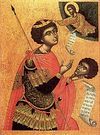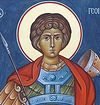

| Previous day | Next day |
| Old Style
November 3
|
Tuesday |
New Style
November 16
|
| 22nd Week after Pentecost. Tone 4. | No fast.
|
![]() Hieromartyrs Acepsimas, bishop, the priest Joseph, and the deacon Aeithalas, of Persia (376).
Hieromartyrs Acepsimas, bishop, the priest Joseph, and the deacon Aeithalas, of Persia (376). ![]() Dedication of the Church of the Great-martyr George in Lydda (4th c.).
Dedication of the Church of the Great-martyr George in Lydda (4th c.).
Martyrs Atticus, Agapius, Eudoxius, Carterius, Istucarius (Styrax), Pactobius (Tobias), Nictopolion, and companions, at Sebaste (320). St. Acepsimas, hermit, of Cyrrhus in Syria (4th c.). St. Snandulia of Persia (380). St. Anna, daughter of Prince Vsevolod I Yaroslavich (1112).
New Hieromartyrs Nicholas Dinariev, archpriest, of Danevo (Ryazan) (1918); Paul Andreyev and Alexander Zverev, archpriests, of Vozmishche (Moscow), Sergius Kedrov, archpriest, of Faustovo (Moscow), Alexander Parusnikov, archpriest, of Ramenskoye (Moscow), Vladimir Pisarev, archpriest, of Kostino (Moscow), and Vincent Smirnov, archpriest, of Khimki (Moscow) (1937).
St. Achaemonides (or Hormisdas), confessor, of Persia (4th c.). St. Winifred of Holywell, Wales (630). St. Hubert, bishop of Liege (727). St. Pirmin, bishop and monastic founder (Germany) (753). St. Theodore, confessor, bishop of Ancyra (8th-9th c.). St. Nicholas of Iveron (Mt. Athos) and Georgia, hymnographer (1308). St. Pimen, monk of Zographou (Mt. Athos) (1610). New Hieromartyr George, priest, of Neopolis, Asia Minor (1797).
Thoughts for Each Day of the Year
According to the Daily Church Readings from the Word of God
By St. Theophan the Recluse

Tuesday. [I Thess. 3:9-13; Luke 11:34-41]
The light of the body is the eye, while the light of the soul is the mind. When the eye of the body is undamaged we see everything around us in our external life, and we know how and where to go, and what to do. So also when the mind is sound, we see everthing in our inner life, in our relation to God and our neighbour, and in how we ought to behave. The mind, the higher side of the soul, combines a feeling of the Godhead, the demands of conscience, and aspirations for what is better than everything possessed by us and known to us. When the mind is sound, fear of God reigns in the soul, as well as good conscience and detachment from anything outward; but when it is unsound—God is forgotten, the conscience limps on both legs, and the soul wallows in what is visible and obtainable. Then it is a dark night for that person—concepts are confused, deeds are in disharmony, and the heart is constricted with hopelessness. Circumstances which he encounters push him and he is drawn after them like a wood chip in the current of a river. He does not know what has been done until now, what he is now, and how his path will end. On the hand, he whose mind is sound, fearing God, conducts his affairs with circumspection, listens only to the law of his conscience, which gives a uniform harmony to his entire life, and he does not plunge himself into things of the senses, taking wing through hope in future bliss. From this his view on the entire flow of life with all that it touches is clear, and for him all is full of light, as when the bright shining of a candle doth give one light (cf. Luke 11:36).
Articles
 Martyr Aithalas of PersiaThe Holy Martyr Aithalas the Deacon, by order of the Persian emperor Sapor II, was put to death by stoning in the year 380 for confessing Christ. |
 Venerable Akepsimas the Hermit of Cyrrhus in SyriaSaint Akepsimas, Hermit of Cyrrhus in Syria lived for sixty years in the desert, not far from Cairo. |
 Saint Snandulia of PersiaSnandulia was a devout Christian of the city of Arbela who visited those who suffered in prison for the sake of Christ. |









